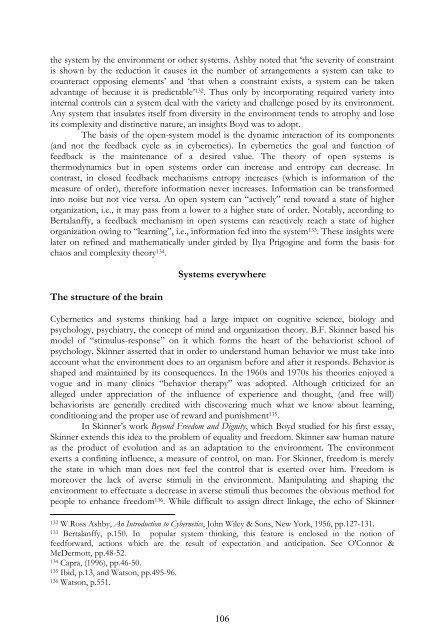Science, Strategy and War The Strategic Theory of ... - Boekje Pienter
Science, Strategy and War The Strategic Theory of ... - Boekje Pienter
Science, Strategy and War The Strategic Theory of ... - Boekje Pienter
Create successful ePaper yourself
Turn your PDF publications into a flip-book with our unique Google optimized e-Paper software.
the system by the environment or other systems. Ashby noted that ‘the severity <strong>of</strong> constraintis shown by the reduction it causes in the number <strong>of</strong> arrangements a system can take tocounteract opposing elements’ <strong>and</strong> ‘that when a constraint exists, a system can be takenadvantage <strong>of</strong> because it is predictable’ 132 . Thus only by incorporating required variety intointernal controls can a system deal with the variety <strong>and</strong> challenge posed by its environment.Any system that insulates itself from diversity in the environment tends to atrophy <strong>and</strong> loseits complexity <strong>and</strong> distinctive nature, an insights Boyd was to adopt.<strong>The</strong> basis <strong>of</strong> the open-system model is the dynamic interaction <strong>of</strong> its components(<strong>and</strong> not the feedback cycle as in cybernetics). In cybernetics the goal <strong>and</strong> function <strong>of</strong>feedback is the maintenance <strong>of</strong> a desired value. <strong>The</strong> theory <strong>of</strong> open systems isthermodynamics but in open systems order can increase <strong>and</strong> entropy can decrease. Incontrast, in closed feedback mechanisms entropy increases (which is information <strong>of</strong> themeasure <strong>of</strong> order), therefore information never increases. Information can be transformedinto noise but not vice versa. An open system can “actively” tend toward a state <strong>of</strong> higherorganization, i.e., it may pass from a lower to a higher state <strong>of</strong> order. Notably, according toBertalanffy, a feedback mechanism in open systems can reactively reach a state <strong>of</strong> higherorganization owing to “learning”, i.e., information fed into the system 133 . <strong>The</strong>se insights werelater on refined <strong>and</strong> mathematically under girded by Ilya Prigogine <strong>and</strong> form the basis forchaos <strong>and</strong> complexity theory 134 .<strong>The</strong> structure <strong>of</strong> the brainSystems everywhereCybernetics <strong>and</strong> systems thinking had a large impact on cognitive science, biology <strong>and</strong>psychology, psychiatry, the concept <strong>of</strong> mind <strong>and</strong> organization theory. B.F. Skinner based hismodel <strong>of</strong> “stimulus-response” on it which forms the heart <strong>of</strong> the behaviorist school <strong>of</strong>psychology. Skinner asserted that in order to underst<strong>and</strong> human behavior we must take intoaccount what the environment does to an organism before <strong>and</strong> after it responds. Behavior isshaped <strong>and</strong> maintained by its consequences. In the 1960s <strong>and</strong> 1970s his theories enjoyed avogue <strong>and</strong> in many clinics “behavior therapy” was adopted. Although criticized for analleged under appreciation <strong>of</strong> the influence <strong>of</strong> experience <strong>and</strong> thought, (<strong>and</strong> free will)behaviorists are generally credited with discovering much what we know about learning,conditioning <strong>and</strong> the proper use <strong>of</strong> reward <strong>and</strong> punishment 135 .In Skinner’s work Beyond Freedom <strong>and</strong> Dignity, which Boyd studied for his first essay,Skinner extends this idea to the problem <strong>of</strong> equality <strong>and</strong> freedom. Skinner saw human natureas the product <strong>of</strong> evolution <strong>and</strong> as an adaptation to the environment. <strong>The</strong> environmentexerts a confining influence, a measure <strong>of</strong> control, on man. For Skinner, freedom is merelythe state in which man does not feel the control that is exerted over him. Freedom ismoreover the lack <strong>of</strong> averse stimuli in the environment. Manipulating <strong>and</strong> shaping theenvironment to effectuate a decrease in averse stimuli thus becomes the obvious method forpeople to enhance freedom 136 . While difficult to assign direct linkage, the echo <strong>of</strong> Skinner132 W.Ross Ashby, An Introduction to Cybernetics, John Wiley & Sons, New York, 1956, pp.127-131.133 Bertalanffy, p.150. In popular system thinking, this feature is enclosed in the notion <strong>of</strong>feedforward, actions which are the result <strong>of</strong> expectation <strong>and</strong> anticipation. See O'Connor &McDermott, pp.48-52.134 Capra, (1996), pp.46-50.135 Ibid, p.13, <strong>and</strong> Watson, pp.495-96.136 Watson, p.551.106
















